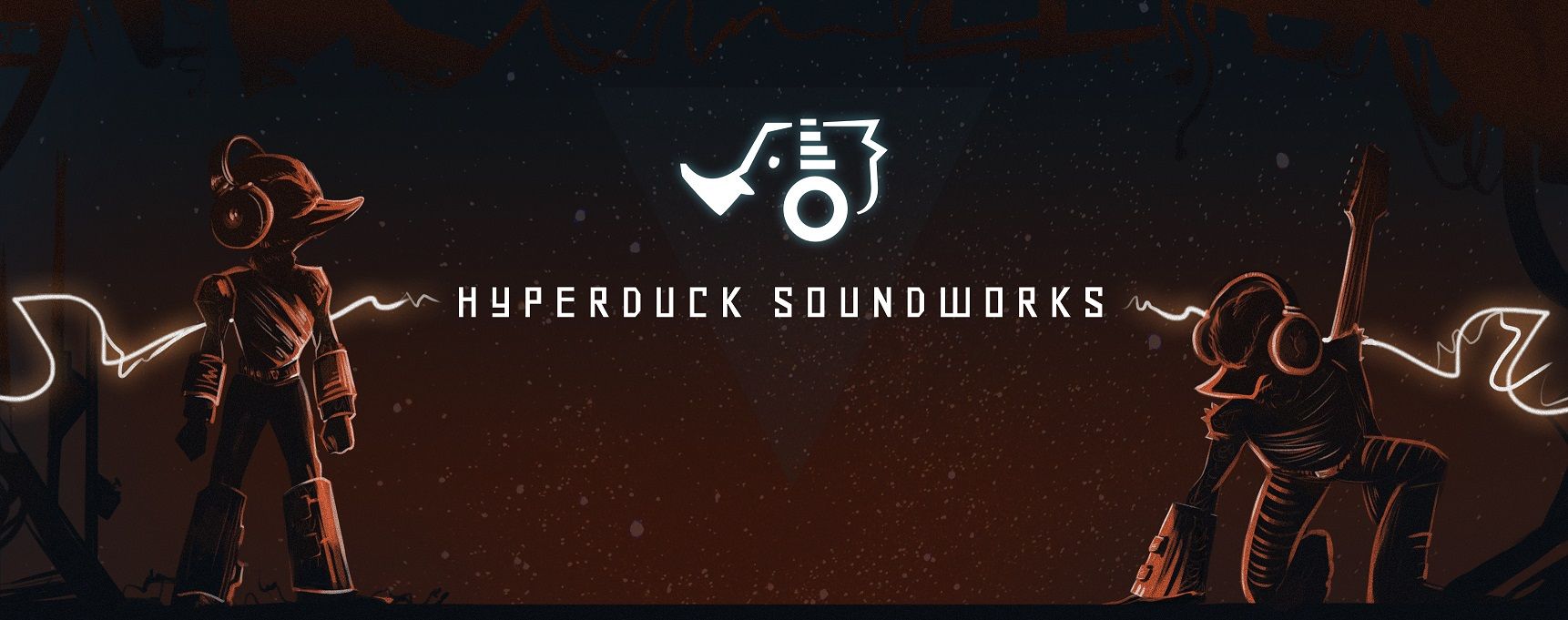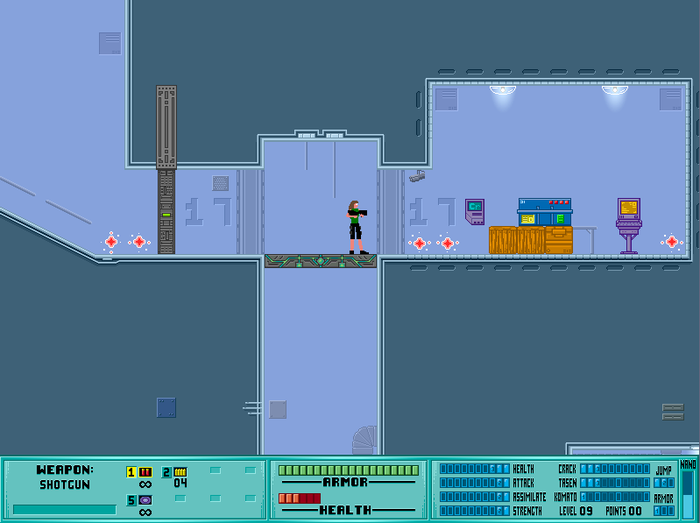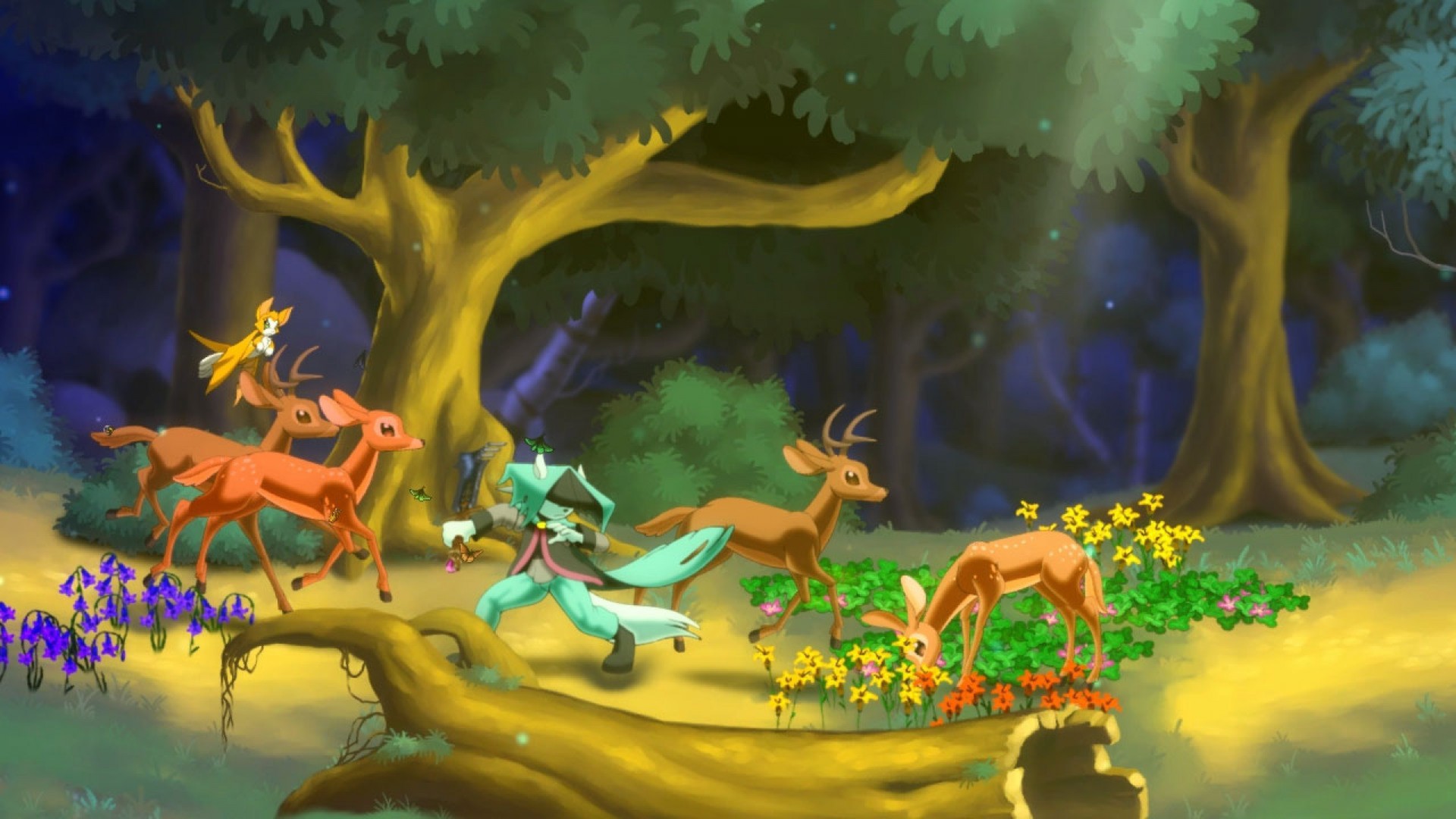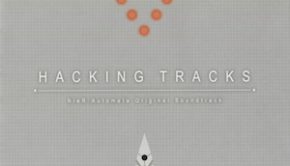Chris Geehan & Dan Byrne-McCullough Interview: HyperDuck SoundWorks
One of most acclaimed indie game scores in recent memory is Dust: An Elysian Tail, which took home an Annual Game Music Award. For the composing duo behind the vast majority of Dust – Chris Geehan and Dan Byrne-McCullough of HyperDuck SoundWorks – the soundtrack certainly marked a career highlight. However, the two young artists had already carved out their own individual sound before Dust on many of their indie game projects, combining chip tunes, hard rock/metal influences and electronic sounds and beats in atmospheric and powerful scores such as A.R.E.S. – Extinction Agenda and Undead on Arrival.
In this extensive interview – by far their longest one to date – Chris and Dan cover their entire musical career in detail, from the beginning of their collaboration in their teenage years to their most recent and ambitious scores. Providing numerous insights into the work of indie game composers, Chris and Dan talk about their musical inspirations, and how they achieve their punchy trademark sound and manage to mix masses of electric guitars and synth beats without losing their hairs.
Interview Credits
Interview Subject: Chris Geehan, Dan Byrne-McCullough
Interviewer: Simon Elchlepp, George Capi, Christian Loescher
Editor: Simon Elchlepp, Chris Greening
Coordination: Simon Elchlepp
Interview Content
Simon: Chris Geehan and Dan Byrne-McCullough, thanks for taking the time today to talk about your work. Let’s start at the beginning: what’s the musical background of you two and how did end up collaborating as HyperDuck SoundWorks?
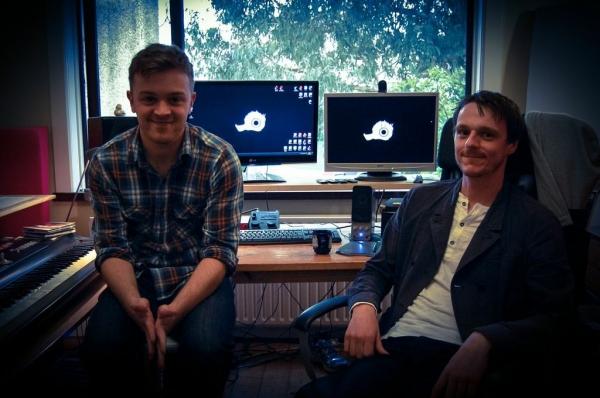 Chris Geehan (left) and Dan Byrne-McCullough (right). © The Digital Fix.
Chris Geehan (left) and Dan Byrne-McCullough (right). © The Digital Fix.
Chris Geehan: Myself and Dan were friends and being teenagers — we just grew up trying to be in rock bands and all that. He was a guitarist and I was a drummer, and from there we both ended up in a course in Music Education because… well, we didn’t really want to do anything else! It was that kind of point where most people were going off to university, and we decided: “No, we will do some music.” And so, we eventually went to university together, over in Newcastle-Upon-Tyne, and it just grew from there.
Most of our stuff through university was actually jazz, which was our main area of study at the time. But when we started with the video game stuff, we found it was a lot easier for us to get into the music that we used to like before, when we were kids – and that was lots of rock’n’roll and metal, which you hear in lots of our earlier soundtracks. For me, video game soundtracks were kind of a way to live out the dream that you have when you’re 16 or 17 about being in some awesome rock band.
Simon: I guess before you started working on video game scores, you had already been video game fans?
Dan Byrne-McCullough: Oh yeah, yeah, both of us had been gamers forever! Basically, since I’ve been alive, from Amiga up to… Yeah, I wanted to be involved in video games when I was a kid – you know, I wanted to make these games. But as you grow up, your priorities change and when you turn 14, 15, you start thinking: “I want to be a rock god!”
Simon: From those Amiga days and I guess the 80s/90s in general, are there any particular influences that shaped your music, and do you have favourite game music artists from that time?
Chris Geehan: I remember David Wise and Donkey Kong Country. I think I actually had the versions of Donkey Kong Country and Killer Instinct that came with an album CD, and I always thought that the CD would be the actual soundtrack, and it was never the soundtrack! It was just these rappers, rapping about Donkey Kong and I went: “No, I want to hear the soundtrack!” And then Killer Instinct, the title theme music with that guitar, would just drive me nuts. That was awesome. Another favourite will always be Mega Man X, just because it took me so long to complete!
Simon: I think it was in 2008 when you did your first game score for Iji. Could you retrace for us how you landed the job on that game?
Chris Geehan: I used to really like this band called Machinae Supremacy. They’re a Swedish rock band who combine heavy rock with sounds from a SID chip, which generated all these old-school sounds. I thought Machinae Supremacy were awesome and I used to go on their online forum, which is where I first met this guy called ‘Spiff’ – and ‘Spiff’ was Daniel Remar, who made Iji. He was working on it at the time, and I was talking to him and he asked: “Well, what are you doing at the moment?” and I responded: “I’m studying music.” And he said: “You know, there might come a day when I need to call upon your services”, and I went: “Yeah, no worries, no worries.”
After that, me and Dan went through our degree and then things accelerated, and we were starting a bigger degree in England. I think it was in our first year in England that I got a email from Dan, and he basically said: “The time has come!”, so I was like: “Right, okay!” We had never put any music together on a computer before, or really properly recorded anything and completed a full song that would then loop. I think some of the stuff in Iji didn’t loop, it just ended and started again.
Dan Byrne-McCullough: It was kind of a learn-as-you-go thing with Iji. We were literally asking: “Okay, how are we going to record this on our PCs?”, so we really just learned as we went along.
Simon: In that process of learning as you went along, what do you think was the most important lesson on that first composing job?
Chris Geehan: I would say the most important thing that we learned from it was how powerful game music can be, because after Iji became Number One Free Indie of the Year 2008 [in a contest by website Bytejacker], so many gamers came up to us and said: “You’re the guys that did Iji? That’s amazing, that’s so cool!” So clearly, there was something in that soundtrack that struck a powerful chord. A lot of people often point out “Tor”, the final boss theme, and I think that’s still one of the best boss themes we’ve had the chance to write. Just enhancing the story with music, that was the thing that I thought was really cool that we achieved.
Dan Byrne-McCullough: For me, I think it really highlighted the fact that having a decent story with the music helps the gamers connect with the game in a so much more enriching way. I mean, the music was okay in itself – it sounds very low-quality compared to what we do now – but I think the fact that people really connected with the game and the story made the music so much more powerful. You see that with many RPGs: the music is probably good, but you get that extra connection from having a story, just like you would with a Hollywood film. It’s like that with countless Hollywood films too; you’re played a theme and you’d instantly be taken to a good place or a bad place, because of the story that it was connected to.
Simon: Exactly, particularly with iconic scores like Star Wars, you hear the first couple of notes and you are in that universe. So I guess with Iji and the soundtrack’s musical style, you were able to continue what you were already interested in musically – chiptunes and hard rock/metal?
Chris Geehan: I think for Iji, it was just… excitement. I don’t think Dan Remar gave us any reference pieces at all, which is something that we always ask for now. People that we work for, they go: “Oh, we really want the boss scene to be like this”, and they show us a quiet string symphony, or they show us some jazz-fusion/prog/death metal tune and go: “Somewhere in between.” “Alright, okay…” [laughs] I think these days, we ask people to reference stuff a lot more, so we can get inside the heads of the people we work for.
But back then, it was just like: “Okay, I could maybe do this Machinae Supremacy thing, I could do this Pagan’s Mind [Norwegian prog/power metal band] sound…” I think it was a chance for us, because it was just like a whiteboard that we could write on whatever we wanted – we didn’t really have any indication of a style that we should do it in. Dan Remar just said: “Do it. Just do what you think is right.” Nowadays, that would be a bit scarier maybe, because the stuff we work on these days is a lot more serious and more complex, so we would always ask what the client wants. But back then, it was like Disneyland – we just did what we wanted and what we really enjoyed at the time!
Dan Byrne-McCullough: I think possibly the reason that Iji sounded like it did was because during our education. All that we did musically was playing in bands, playing live, doing all this study… and so when we first got the opportunity to create music and record it, it’s like you’re getting the chance to do whatever you wouldn’t normally do outside of your bedroom. The first thing for me… it sounds silly, but it was: “I want to make massive guitar sounds and play all my dreams here.” It felt like I wouldn’t ever get the chance to sound like this otherwise, without the game. But it obviously took a massive influence from artists like Machinae Supremacy, because they were the first guys that we heard who took the old video game style and totally revamped it and turned it into something more powerful.
Simon: I guess throughout the years, you have developed something of a signature sound – a mix of hard rock/metal guitars and electronic elements that creates this big, punchy, intense sound that’s lots of fun. Your heaviest score so far has been A.R.E.S.: Extinction Agenda, which brings the metal elements more to the fore. What was your inspiration for this?
Dan Byrne-McCullough: As soon as we were shown pictures of the game, it was: “Cool, it’s Mega Man!” Just the art style was totally there to have that blend of guitars and electronic elements, because the game has got this ‘future/space’ setting. It was just us reacting to how the game looked and trying to create something that took lots of guitars and then lots of technological sounds. Also, I think our only previous game that anyone knew of was Iji, and so the guys at Extend Studio were like: “Yeah, just do what you guys do”, which was a total blessing! You know, whenever someone goes: “Yeah, just do what you feel is right”, that’s really nice of people to let us do that. So we wanted to keep in line with what we’d done before, but try to develop as well.
Chris Geehan: I think the first time we spoke to the developers was on an online forum, and they described the music they were looking for as “future metal/techno”! [laughs] I think we translated that into a sort of modern-day Mega Man/Turrican sound.
Simon: Yeah, you’re right, it plays really well as an update of those classic sounds. I was wondering: both the metal/hard rock and electronic, futuristic sounds are quite aggressive and maybe compete at times. How do you combine them in the album mix without the whole thing turning into one big wall of sound?
Chris Geehan: Actually, A.R.E.S. was possibly the most stressful mixing experience I’ve ever had! [laughs] I think Dan will agree, we lost a few hairs when we were mixing A.R.E.S. We mixed it as we went along, but it became more and more apparent that we would have to go back and balance the mix before we were happy to let the public hear it. Just before A.R.E.S. was released, we spent a very long time trying to get the balance right. I think we just got to the point where we were like: “We can’t do this any longer. We’ve just got to settle with this until the end of time and we’ll never ever be 100% content with everything on this soundtrack.”
That being said, we’re both happy with it and it’s done very well for us, but I think there was another lesson that we learned at that point – alongside the lesson of mixing correctly – that you have to eventually let go of a mix. Just let it go out into the public, otherwise you’ll just stay on it and you’ll mix forever and ever. You’ll probably mix it into a worse state than it was in originally. I think to get the sound balanced, we just listened to other music, we tried to emulate certain elements of other heavy metal and electronic music. Still, you can only emulate other people so much, up to a point where you realise you’ve created your own sound. Once that came, we just tried to keep the sound that we had: keep the drums punchy, but not over the entire mix; keep the guitars really present, but not let them take over the melodies; and make sure that the melodies are lining the entire thing.
Dan Byrne-McCullough: There are the two elements, the guitars and the electronics, so compositionally it starts with either a riff on the guitar, then you’re working around that with your other instruments – or sometimes, it would be more of an electronic sound and there would be really heavy synth-based stuff and then it’s just basically the job of the guitar and the drums and the bass to back that up in a rock context. It’s really whichever came first in the inspiration, the guitar riff/melody line, or the electronic element, and we used the other instruments, whichever ones were left, to back up the composition.
Simon: What I find really interesting is that on the one hand, you’ve got these metal/electronic-inspired scores like Break Limit and A.R.E.S., and on the other hand, there’s something like The Blocks Cometh, which is quite a bit calmer than your other soundtracks – I guess because it’s a puzzler. Was that change of genre and mood a challenge?
Chris Geehan: I think I did that one mostly on my own… I used chip sounds a lot for that, the best I could get. The chip sounds module I used was actually recommended to me by Richard Vreeland (Disasterpeace). I was talking to him and I was like: “Dude, I need a good module for working on chip sounds, but I need something that I can really tweak.” He just showed me some of the stuff he’d been doing and I thought: “Yeah, that’s me sold!”
How The Blocks Cometh came about… I contacted the developers, because I liked the look of the game so much, I was just like: “I want to work with you guys.” Actually, I don’t think I even asked for payment, but they still gave me something. I just wanted to rock on the game, because I liked the look of it so much. I think it was like looking back at Iji, because it had been so long since I had worked in that kind of chiptunes styles, and I was wondering if I had a better understanding of it now. It was a lot of fun, that project. I think it was just one of those things where I had complete freedom again. It was kind of my excuse to flex the old chiptunes muscle and see if it was still active, and I guess it was!
Simon: I guess puzzlers can pose a particular challenge – on the one hand, you want the gamer to be engaged by the music, on the other hand the gamer has to focus on the puzzles. How difficult did you find it to write music that is engaging, but doesn’t distract too much at the same time?
Chris Geehan: I played the game a lot and I played it a lot with the music as I wrote it. The developers gave me a developer build for me to use on my iPhone. I had never seen this before, and it was amazing! So they sent me this work-in-progress and I would take a draft version of the track that I had been writing, pull it as an MP3 on the iPhone – there was no sound in the game yet – and I would just sit and play the game for two hours at a time. It just helped me to identify where it was getting too busy or too low. The developers also played the music a lot, so there were three heads involved and it was enough to pick the best moments in the music, so we could really push them to the fore a lot more often. I mean, the tracks are quite long and the whole point was that the music has ups and downs. I think that’s definitely one of the best examples of dynamics for that type of puzzle game. You can have really energetic points that may just enhance a particular moment where the blocks are coming down really quickly, or the game’s calm and collected, and the music’s taking a breather.
Not only do Dan and I want a project to sound right, but we’re not happy until whoever we’re working with gives 100% thumbs up – maybe like it even better than we do! [laughs] I think it was just good to sit with the The Blocks Cometh developers and really pick their brains, because obviously, it’s their baby, so no one imagines it clearer than they would. I think they actually realised that what I gave them wasn’t always what they had imagined, but some of the stuff I gave them was actually better than what they had in their heads. I was kind of the third piece of the puzzle – I made points about the gameplay to help them and they made points about the music that helped me out, so it was a good collaborative effort.
Simon: Yeah, I guess that’s the ideal scenario for a composer, if you can work really closely with the developers and you get feedback from them, and you can give input and maybe improve on their ideas.
Chris Geehan: Oh yeah, if you’ve got the time to do that, you’re always going to get a better result. I always recommend it.
Simon: Undead on Arrival is one of your soundtracks that has quite a light-hearted side to it. It has the metal/electronic mix, but it’s also quite fun and cheeky at times, because the game treats its zombie-doomsday scenario tongue-in-cheek. There’s even bits that sound like Castlevania references. How difficult did you find to put these fun bits in with the action elements and not have the whole thing become too self-consciously ironic?
Chris Geehan: With Undead on Arrival – yes, it does have Castlevania references and the developers were very specific about their game music likes and tastes. With the horror element, I don’t know if this was their idea… I think it was our idea, just because the whole thing is quite upbeat, but at times, it has this weird eeriness to it as well. We just wanted to mix that charming cartoon style with the fact that it’s the apocalypse and Groundhog Day, so it’s zombie apocalypse forever.
Dan Byrne-McCullough: In the game, Bitejacker, each level has three stages of music. The idea was that it started out with the basic sound and then it could progress to a more amped-up version of that and then it could do that again. When you got a better combo or score, the music changed, so we obviously had to think in terms of: “Here’s got to be the quietest, most standard bit of music, and then it’s got to amp up, and then it’s got to amp up again.” So I guess the natural plan of progression was: “Well, we’ll put a heavier sound in it.” I think that’s how we ended up with doing lots of guitars and just making everything bigger. The first parts of each song are written in the style of old school video game sounds, because that was the style of the game.
Chris Geehan: I don’t think we did that on the actual release. For the release, we actually went back and we re-arranged everything, so that the tracks were a lot longer and had a dynamic rise to them, because if you listen to the in-game music, it’s completely different, because it had these three different stages.
Simon: Actually, that’s always a really interesting point – translating interactive game music into a linear album format. Just in general, how difficult do you find that process?
Chris Geehan: I think Undead on Arrival was one of the tougher ones, because the three phases would cross fade between each other quite well, but they would be quite disconnected if you put them back to back.
Dan Byrne-McCullough: It was only 30 seconds of music, each phase.
Chris Geehan: It really was three 30 second versions of the same thing, so the question was: how are we going to make this into a proper song that has a dynamic rise to it and feels like it’s not just pieced together? We actually just had to go back and re-arrange – not re-write, but re-arrange – a lot of the music in the actual project files. So essentially, we were making new versions of the songs.
Dan Byrne-McCullough: With that score in particular, we did get a lot of guest artists for the album release, which was a way of getting someone to look at our material with a fresh sense of what the song could be. You know, these guest artists could take just a tiny melody or part of the tune and they would make a whole version in their style, and that was key for the album release to work.
Simon: Actually, that would have been my next question. There’s a pretty impressive list of other indie game composers on the soundtrack, through the remixes that they did. How difficult was it to arrange the whole undertaking, or is the indie game music community quite tight-knit, so you guys knew each other already and getting people for remixes was easy?
Chris Geehan: There was a lot of organisation on my part – keeping our work in sync with the task to have the entire line up of remixes completed in time. I was doing that and then I was corresponding with the The Blocks Cometh guys, who actually made the artwork for the album cover. I guess, we didn’t really say anyone could do a particular song and that would be their song, we just said: “Anybody just remix what they’re going to remix.” In the end, we actually ended up with a lot of remixes of the same song!
Dan Byrne-McCullough: It’s a strange thing to look at your own piece after the remixes. One of the reasons to create the remixes was that we’d have more content, there would be more to listen to. That sounds quite controlled, but that was it: we needed more content, we wanted to make something that people might actually want to buy! It was just a way of creating more music and having fun with it.
Simon: Yeah, absolutely. One interesting thing about HyperDuck SoundWorks is that it’s probably a bit of a rarity in the indie game music scene, in the sense that you operate as a team of composers and sound artists, while most indie composers are one-man teams. What kind of advantages do you think does this kind of set up give HyperDuck SoundWorks and makes you attractive for potential clients?
Chris Geehan: When we work on a project, we try to make our turnaround doubly fast, but just as good as anybody else who would do it on their own. It’s a quicker turnaround, but it’s not lacking in quality – you’re not getting a draft, everything’s got a lot of thought put into. It also means… Dust: An Elysian Tail was one of the best examples of late. Dan basically had to edit…
Dan Byrne-McCullough: Yeah, it was around 1700 lines of dialogue.
Chris Geehan: …for all the voice acting in Dust and that was within less than two months. If you had to do that on your own… I think we both lost our minds a wee bit, but that was one of the times where we were like, if this had been a one-man team, we couldn’t have done this. There’s just no possible way. There would be times where I’ll do the sound design, while Dan’s off preparing new drafts for another project. You know, there’s no way you could do that with a one-man team. I think at times, we still feel so busy that we could use an extra pair of hands, but most of the time, me and Dan have it covered. We work within our means, which is what makes us quite an efficient team, I think. We don’t bite off more than we can chew.
Dan Byrne-McCullough: Compositionally it’s helpful, because as any composer will know, sometimes you can sit down at the keyboard or the guitar for hours, and you come out with nothing. Obviously, everyone gets to that stage at some point, but it’s a great thing that if I’m lost or stuck on a track, I’m able to throw it over to Chris, and he’ll take a look at it with fresh ears and usually come up with something. To have that back and forth is actually really useful, and it’s only because we’ve been working together for so long and we know each other, that we can get into the mind of the other person nice and quickly. So, it benefits each of us in that we get the work done faster and it’s nicer to have the collaboration, and it means that the client is going to get a much broader mix, and they’re going to get it done faster than most.
Simon: You’ve already mentioned Dust: An Elysian Tail – I guess in many ways, it’s quite a departure from your earlier work in terms of the music’s general atmosphere, in terms of the compositions’ length… How did you decide upon that particular mix of synths, rock and orchestral elements that makes up Dust, and how much was that style – which is quite different from your earlier work – impacted the game’s very striking artwork?
Chris Geehan: I think Dean Dodrill [designer and sole programmer on Dust] had a pretty big hand in the musical direction. In all regards, Dean had a really impressive vision for Dust and he’s got such a lot of knowledge, especially when it comes to game soundtracks. He really guided the way for us and he was really sure of what he wanted. At the same time, he was more excited about taking us only so far and going: “Right, you guys do the rest. You surprise me with whatever you think is the right thing to do next.” He wouldn’t sit with us and dabble with all the details of the music – he would just say, up to a point and quite specifically: “These are the kind of pieces that I think would really suit the mood of this area.” We would then just go away and come back with stuff – often with a lot of orchestral elements. Dean was really into James Newton Howard, Hans Zimmer, Harry Gregson-Williams…
I found Dean on an online forum and I thought: “Oh my goodness, I’m just going to try.” At that time, we didn’t even have A.R.E.S. yet, all we had to stand on was Iji. So I sent Dean Iji and I said: “Look, I’d love to try out some tracks for your game and if you don’t like them, no worries, or I can just help you find someone who will suit the game.” Bottom line, I was like: “Please, please, please, let me work on your project!” [laughs] He said: “Okay, I want this for a boss track”, and he sent me some Metal Gear Solid 3 track by Harry-Gregson Williams – not the full track, just a self-made edit of 50 seconds of the cue! So I was like: “Right, okay, I’ll do something like that.” Then he also sent me some stuff from Ys III and IV, I think. If you listen to the latter end of the Dust soundtrack, that’s got the Ys influence right there.
Dan Byrne-McCullough: That was what the soundtrack started out sounding like at first.
Chris Geehan: That was the first style of the score, that’s what the entire game was going to sound like. I did the first two themes, “Abadis Forest” and “Short Fuse”, wrote them within 24 hours and sent them back to Dean, and Dean responded: “Yeah, that sounds great, you’re in!” and I was like: “What?!” [laughs] So we got in straight away. With Dean, at the start of the process, it was kind of him saying exactly what he wanted, but by the end of the development – we had been working with him for about four years – he was just so comfortable with our writing that he would go: “You know, just do whatever you think is right.” He was more excited about the idea that he didn’t really know what was going to come out of it – he had the confidence to leave us to it. Of course, he had so much to do anyway. If you ever read anything about Dean’s last few months on Dust, music direction was not on his to-do list! He had so much code and art and animation to do…
Simon: Yeah, it’s such a massive one-man project, it’s difficult to wrap your head around how you’d put all that together as one person. Your music for Dust is quite ethereal, wintry and quite different from the punchy sounds of A.R.E.S. and Undead on Arrival. Did that change of direction pose any particular challenges or did it feel like a natural expansion of your previous works, for example Book of Heroes, which was a fantasy game as well?
Dan Byrne-McCullough: See, just before Book of Heroes, there was another game that we were enlisted on and it was basically an RPG. It was never completed, but we finished the soundtrack for it, and as it was an RPG, it gave us a chance to do more of the thematic stuff that you’d be used to hearing in role-playing games. Obviously, we’re both big fans of that genre – of course, we’re massive fans of Final Fantasy and all those series – so that really was a chance for us to mix in some of the music that we grew up listening to. It’s a different sound than what we’re known for, so it was really a chance to try it out and see how good we could do it.
So, we finished the music and thought: “Great, that worked out quite well”, and that really helped us to get the right sound for Book of Heroes, which again has that RPG style and setting. You know, we just couldn’t have popped our previous music – rock guitars and all – in there, so it was a case of us choosing a project that would expand our sound palette and it would get us working and learning.
Like Chris said previously, everything we’ve done has had to have some sort of learning experience in it, because we are learning as we go. It’s important to push yourself to do different styles as composers, but at the same time, it’s great to carve out your own style and it’s also massively important to do so. Still, we’re learning from doing all these projects and Book of Heroes was a great way for us to look into the different orchestral palettes and sounds associated with that type of music, and that probably did prepare us in some ways for Dust, whenever we had to make Dust more orchestral and light in places.
Simon: You’ve mentioned a couple of times that you started working on projects because you contacted the developers through internet forums or similar means. Is that the usual process or is it a mix of you contacting people and clients coming to you?
Dan Byrne-McCullough: We had done Iji and were still at university, so we thought: “Well, why not try and do another one and see if we can get better.” It was kind of a side project, almost. Chris is really good at getting in touch with people in forums and online.
Chris Geehan: I badger them until they give us jobs. [laughs]
Dan Byrne-McCullough: We just had to keep contacting people and then, as we eventually got more and more games out, people started contacting us. We just kept working, working and working, and contacting people, and now we’re getting more work from people contacting us, to the point where sometimes we have to look at a project and go: “Can we actually finish and produce this, or should we pick a different project?” So we’re very fortunate in that way, and it’s been a great progression from when we started working and obviously tried to get any sort of work.
Simon: Yeah, absolutely. On soundtracks like A.R.E.S. and Iji, the sound’s quite forceful and you pretty much throw the listener into the action right away. One of the striking things about Dust is the length of many cues, and also how they ebb and flow and build very beautifully. What inspired you to write these quite long pieces and in how far did you have to change your approach to composing?
Chris Geehan: We listened to a lot of cinematic scores in particular – they don’t cut to the point right away. One of my favourite film composers is Harry Gregson-Williams and I really like the way how even in his Metal Gear Solid scores, he doesn’t just cut to the point. He does score it like a film, and because Dust had become this big story, we were going with this cinematic direction… A lot of the references that we had been given by Dean were slow-building. He’d go: “Listen to this track and skip to 1:50”, and that’s the bit he would want me to listen to, but I would listen to the whole thing anyway. [laughs] There were times when I played Dust with these complete reference tracks and I thought: “This doesn’t feel wrong.” The game’s got a good build up and none of the levels really ask everything of you the moment you step into them.
Even at the points in Dust where you enter into a war zone, you still work your way up to the end of the level, so I always thought it was possible to have these dynamic paths that build as the player is going through the levels. It helps build the tension and the excitement in each area that you’re in. I think one of the best examples is “Cirromon Caverns”, which starts super quiet and it gets quite big, but it takes its time. I think it was a bit of a bold move that it starts so quietly, but a lot of people actually said they thought it was brilliant that it starts so intimate and that there’s then this crazy, big, building sound. I guess video game soundtracks don’t really do that style, that kind of slow build that often, so I just wanted to see if it could be done and see if it could work properly – and I guess it did work properly.
Simon: Yeah, it works brilliantly on Dust. It’s interesting you mention “Cirromon Caverns”, because it starts so quiet and you start to listen closer, and then it develops and gets bigger and bigger, and you realise the scope of the piece – it’s a beautiful moment. Moving onwards, the biggest project in 2013 was Penny Arcade’s On the Rain-Slick Precipice of Darkness Episode 4. Scoring a humorous retro RPG like that is an interesting proposition – obviously it’s an homage to 16-bit RPGs, but then there’s also a whole lot of other indie games that have already reprised and re-interpreted that vintage RPG aesthetic in the last few years and have left their mark. And on top of it all, Rain-Slick Precipice is also a bit of parody of the genre. How did all this impact your musical direction for the game and did you ever feel like you had to follow or break with tradition? Did you ever consider using chiptunes to score the game?
Chris Geehan: In terms of musical direction for OtRSPoD4, Robert and Bill already had half a vision of what they wanted. They’d received a more apt sound in terms of the visuals for Episode 3, and after hearing our work, he wanted to try a less traditional approach to the series sequel. That said, they had influences of Chrono Trigger and Phantasy Star IV to share with us, to name only a few of the references, and wanted us to expand on these references with our own.
We never considered using chiptunes for referencing during this project. I mean, sure, you could consider them for thematic referencing, but for aesthetics, very little of it was relevant to the visuals and even less so to the references Robert and Bill were showing us during the early stages of Episode 4. I think we went between traditional and alternative aesthetics and writing styles for OtRSPoD4, and that’s exactly what Robert and Bill wanted us to do; make it familiar to what they had in mind, but put our own mark on it where and however we can. We are lucky and grateful that they, and so many people we work with, bring us in to let us develop the sound of the music in our own way, with direction of course.
Simon: Earlier in the interview, you talked about how a game’s music can have more impact when it’s used in a game with a great story. When you created the music for Rain-Slick Precipice, did you have the game’s full story in front of you and wrote to it? How did you identify what the game’s story needed musically to impress gamers?
Dan Byrne-McCullough: And I still agree with that, totally. Robert and Bill did hand us the story so we knew who we were dealing with, character-wise, and what we were dealing with in the grand scale of things, across Episodes 3 and 4. With that being said, we wrote the music based entirely on how the player discovered more of the story, since we couldn’t really represent future parts of the story, area or characters, before they were shown to the player. However we did mix one of the theme melodies from earlier in the game with another track much later on in the game – just a small amount of hinting – but I don’t want to give away spoilers, so that’s gotta stay pretty vague I’m afraid.
Simon: You’ve previously talked about RPGs that you’ve scored earlier, and that you’re still learning from all the different projects you work on. After having done Rain-Slick Precipice, what does it feel like to look back on your previous RPG soundtracks and how has it pushed as composers?
Chris Geehan: When we look back at our very early writings, we see the massive amount of change and the long way we’ve come since the earlier years of scoring for games. It has pushed us to improve our researching/referencing and expand our vision when scoring for such a big world and story that many RPGs lay before you. Trying new sounds and techniques in writing is something that we are constantly doing, and bigger projects give the opportunity for such experimenting!
Simon: Other scores you did in 2013 like Knightmare Tower and SNAAAAAKE! are on the shorter side and on album don’t run much longer than 10 minutes. What sort of opportunities do these smaller projects offer you, both creatively and financially?
Dan Byrne-McCullough: Smaller projects like these can be quicker to finish, for sure. I wouldn’t say the size of a project always defines the level of the creative value; on smaller projects it’s fully possible to get a rich result with the score, without a doubt. I can see how smaller projects can appear as constrictive in some ways, when you’re wanting to expand on themes and let them breathe throughout various experiences in the game. That said, we tend to work with smaller projects that work with smaller soundtracks quite well. It doesn’t feel like we’re breaking up our workflow in a bad way. In fact, breaking up the workflow between smaller projects helps bigger projects. We get time to work in various styles and step back into a long going project with a fresh perspective.
Simon: In an email exchange, you mentioned that you had done a vinyl single and an animated short to introduce yourselves to attendees and potential clients at this year’s Game Developers Conference. How much do you have to actively look for clients, and in how far can you pick your projects these days?
Chris Geehan: Yeah! We released a single called “Once Upon a Time”, and had a local company in Belfast called Flickerpix make a animated short for an edited version of the single. We had 7” vinyls designed and printed, and got a great reception from anybody that saw them before, at and after GDC. We are fortunate that we do not have to pursue clients as often these days, and we get a lot of great conversations with great minds and really inspiring creative teams that we want to collaborate with, so there are a lot of amazing project opportunities coming to us throughout the year.
We are constantly speaking with developers and artists about ideas and potential projects, so it’s not a case of us simply awaiting projects to come in. It’s a bit organic how a lot of work comes to us, simply out of making friends and sharing similar interests with extremely talented people and teams. We are happy to say that we are packed out with projects for the foreseeable future, but we are always looking for new projects, and able to continue expanding our workload, since there are so many great minds out there, creating beautiful worlds, writing great stories, and we always want to be a part of that!
Simon: I think that’s all the questions I have – thanks so much for your answers, that was great! Lastly, is there anything you’d like to say about your work or do you have any messages to our readers?
Dan Byrne-McCullough: I’d just like to quickly say to anyone who has emailed us or tweeted us or bought our music or said anything nice about any of our music: thanks. There are some great people out there, who really help us get our music out, which is amazing – and having people actually pay for it and help us to be able to keep doing the stuff that we love to do is fantastic, so thanks to them.
Chris Geehan: That’s also what I’ve got to say – we’re really grateful. We do feel lucky, but obviously, we’ve put a lot of blood and sweat into trying to get where we are today. I don’t think we could have done if people didn’t turn it on, said “Hey, that sounds cool!” and bought our music. I don’t think I’ve shown Dan all the messages we get through Bandcamp – the amount of times that people add a message onto their purchase, just to say how great the music is… I always, always read them and that’s really awesome of you all, so: thank you.
Posted on April 29, 2014 by Simon Elchlepp. Last modified on June 11, 2014.

